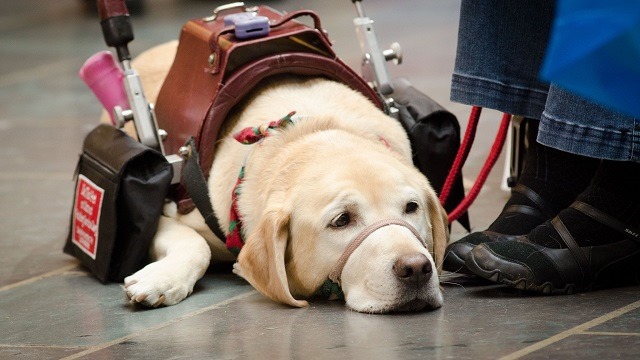Service and Support Dogs: Welfarism versus Rights

Do we have a right to keep dogs and other animals in service for physical and emotional support? It’s a question that came to the fore in my mind at a conference at the Institute for Human-Animal Connection at University of Denver.
The theme of the meeting was “Illuminating neurodiversity in human-animal relationships,” and my own presentation was on Dolphin and Whale Brains: A Challenge for Primate-Centered Views of Intelligence.
But what took my attention most was the number of service dogs who were present.
The audience of over 500 people consisted mainly of social workers, therapists and individuals in the autism spectrum disorder community, many of whom had support dogs in harnesses by their side. The dogs were “working” and therefore couldn’t engage in petting, play or other natural activities. Instead, they each remained at the side of their “handler” and looked for any treats that might come from obeying and performing the trained tasks. Some whined and begged to go elsewhere.
The dogs’ lives were so limited by their service that they were actively being prevented from thriving.
It was difficult to ignore the inequities of such a relationship. And as the two days wore on, I began to question whether the dogs’ lives were so limited by their service that they were actively being prevented from thriving.
I was particularly struck by a presentation given by veterinarian Zenithson Ng, who talked about how anxiety and other emotional problems can be identified in support and assistance dogs and how these problems can be mitigated. He emphasized the serious responsibility handlers and family members have for attending to the welfare of the dogs. Certainly, no one in the audience could disagree that these dogs need the best care available.
But there is a fundamental premise that separates my views from those of Dr. Ng and many other people who were at the conference. I simply cannot accept that it is ethical to use nonhuman animals in this way.
The issue comes down to the longstanding welfare versus rights debate. Welfarism allows for the use of other animals to benefit humans – be it for research, food, entertainment, emotional support or whatever – while treating them kindly within the bounds of their function. Welfarism offers protections for those animals to the extent that the interests of the animals do not interfere with those of the humans. The needs and desires of the nonhuman animal take a back seat to those of the human.
A rights-based approach, on the other hand, recognizes the fundamental value and inherent entitlements of our fellow animals to have the opportunity to thrive outside of their use as a means to an end.
Service dogs and assistance dogs perform several physical and emotional tasks for the handler that can be helpful. And both dogs and people can gain from this kind of relationship. But there is real reason to doubt that they all do or that all the elements of this relationship are ethical.
I left the conference wondering whether many of the psychological tasks the dogs were charged with were either unnecessary at best, or actively hindering the emotional development of both dog and handler at worst.
There is real reason to doubt that all the elements of this relationship are ethical.
In my own field of expertise, which is to do with intelligence and self-awareness in dolphins and other cetaceans, I’ve seen the negative consequences of their use, not only as entertainment in marine parks, but also in so-called “dolphin-assisted therapy” programs for people, especially children, with autism. I have seen great damage done to both the cetaceans and the humans by this form of exploitation and in the perpetuation of the idea that other animals exist to meet our needs.
And my peer-reviewed scientific studies show that, while not exactly the same as employing service animals, animal-assisted therapies in general produce, at most, nonspecific and moderate effects which can be reproduced by objects and interventions other than live animals.
The more I learn and experience about the use of other animals in therapeutic and supportive contexts, the less comfortable I am with the ethics and the benefit of the entire enterprise.
4 Replies to “Service and Support Dogs: Welfarism versus Rights”
Comments are closed.

Thank you for your willingness to defend the rights of non human animals. Your work does not go unnoticed.
You are asking the right question, but the answer may not be clear-cut. Not all service dogs are as frustrated as the ones you describe, who accompanied their dependent humans to your presentation. I’ve met service dogs who seemed thrilled to be performing tasks and receiving praise. I am opposed to the exploitation of animals, but not to symbiotic relationships between human and non-human animals. Rights-based AND welfare-based approaches would seem to be necessary to establish some ethical rules of the game, I think. Would you publish your comment, or allow us to publish it, on the AnimalPeopleForum.org ? We’d also be interested in anything we could publish about cetacean intelligence vis a vis primate intelligence.
I have long been concerned about the ever expanding “use” and exploitation of animals, especially dogs, to entertain, benefit and render service for people. In most instances there is little if any benefit for the animal who is sacrificed for the needs of our species, and/or “on duty” and worked 7 days a week…as guide dogs, drug sniffers, guard dogs, police dogs, K-9 troops and seemingly unending new uses as more is learned about their innate abilities and talents.
I wholeheartedly agree. The conference was a very non typical situation. Humans get bored, fidget and want to be elsewhere in those situations too! In everyday life they would perform a variety of activities, have lots of down time and receive much appreciation.